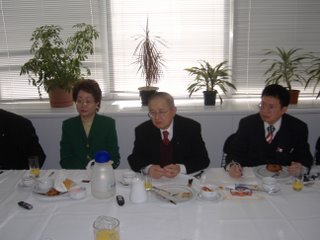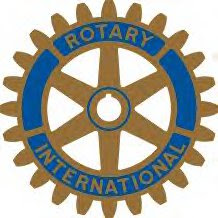
This month's guest speaker was Professor Lung-chu Chen (center) who received his doctor of the science of law degree from Yale University and is Chairman of the Taiwan New Century Foundation. Professor Chen is also a Professor of Law at New York Law School and President of the Taiwan United Nations Alliance. He announced that he was proud to be among fellow Rotarians. Professor Chen was a Rotarian in Orange, Connecticut, USA, and Charter President of Taipei Far East Rotary Club. He proudly reported that there are more than one hundred Rotary clubs in Taipei. Also in the photo are Dr. Jaw-Ling Joanne Chang (left), Deputy Representative of the Taipei Economic and Cultural Representative Office. NY Rotarian Paul Hsiao (right) was the meeting's moderator.
The Professor outlined his concern regarding the injustice of excluding Taiwan from the United Nations. “There are 192 countries in the world and Taiwan is the only country that is not a member of the United Nations.” As a democratic, economically prosperous, country of 23 million people, Taiwan wants to be a member of the community of nations. “We are not asking for membership as a representative of all of China, but as the independent state of Taiwan” (ROC), he noted. Political reality is that Taiwan exists as an independent state and is a separate country from the People’s Republic of China . The “One China” policy needs to be restated as the “One China and One Taiwan” policy.
The Republic of China (Taiwan) was a member of the United Nations until 1971. However, because of the People’s Republic of China (PRC) pressure and the United States' improving relations with the PRC during the early 1970’s, the United Nations General Assembly approved Resolution 2758 that recognized the People’s Republic of China (PRC) as the only lawful representative of China in the United Nations and its related organizations.
Resolution 2758: Restoration of the Lawful Rights of the People's Republic of China in the United Nations
The General Assembly,
Recalling the principles of the Charter of the United Nations,
Considering the restoration of the lawful rights of the People's Republic of China is essential both for the protection of the Charter of the United Nations and for the cause that the United Nations must serve under the Charter,
Recognizing that the representatives of the Government of the People's Republic of China are the only lawful representatives of China to the United Nations and that the People's Republic of China is one of the five permanent members of the Security Council,
Decides to restore all its rights to the People's Republic of China and to recognize the representatives of its Government as the only legitimate representatives of China to the United Nations, and to expel forthwith the representatives of Chiang Kai-shek from the place which they unlawfully occupy at the United Nations and in all the organizations related to it.
1967th plenary meeting, #25 October 1971.
While many member-states supported the 1971 resolution recognizing The People’s Republic of China (PRC) as the only lawful representative of China, Professor Chen clearly pointed out that the PRC had itself only been in existence since 1949 and that it has never ruled Taiwan for a single day. Taiwan and China have divergent political, economic, social and cultural systems and are two independent states.
Historical Background
Following China’s defeat in the first Sino-Japanese War in 1895, China ceded Taiwan to Japan in perpetuity. However, while Japan spent the next 50 years attempting to make Taiwan part of its empire, Japan’s rule of Taiwan came to an end with its defeat in World War II in 1945. In 1949, with the end of the Chinese civil war between the Kuomintang (KMT) and the Chinese Communists, the ROC administration, led by Chiang Kai-shek, was exiled to Taiwan. In the San Francisco Peace Treaty with Japan and the Peace Treaty between the ROC and Japan, both of which came into force in 1952, Japan formally renounced all rights, claims and title to Taiwan. However, the treaties failed to determine who was the beneficiary state upon Japan’s renunciation. As such, Taiwan’s legal status remained undefined, but it was expected, at the time, to be settled through the United Nations in the near future.
The question of “Chinese Representation” at the United Nations was left to be addressed by the General Assembly. Unfortunately, “The Moratorium Formula” which was implemented whenever the situation was put before the General Assembly postponed a decision year after year. This postponement cycle lasted until the early 1960’s when many former African and Asian colonies acquired UN membership. During this time, the new member-states inherited the conundrum of supporting the ROC which represented China at the UN, but did not have access to the mainland; or to support the PRC which had control of the mainland, but was denied UN membership. Another delaying tactic at the time, the professor outlined, was the “Important Question Formula” which stipulated that any decision regarding Chinese Representation required a 2/3 majority from the General Assembly, and thereby further delayed any action on this issue.
Until 1987, Resolution 2758 was not openly questioned by the Taiwanese people primarily because Taiwan was under “martial law” and its citizens could not protest the fact that they were international orphans. However, by 1993, Taiwan had attempted to gain entry in the United Nations under joint proposals sponsored by countries friendly to Taiwan, considering, among other things, Article 4 of the UN Charter.
United Nations Charter - Article 4
1. Membership in the United Nations is open to all other peace-loving states which accept the obligations contained in the present Charter and, in the judgment of the Organization, are able and willing to carry out these obligations.
2. The admission of any such state to membership in the United Nations will be effected by a decision of the General Assembly upon the recommendation of the Security Council.
Each year, since 1993, the government of Taiwan has asked friendly member-states to submit a proposal (click here to view the General Assembly proposal) http://www.un.org/documents/ga/docs/53/plenary/a53-145.htm to the UN requesting Taiwan’s participation. Paradoxically, only mostly small, developing nations in Africa, Central America, and Pacific Islands region have official diplomatic relations with the Republic of China, while many of the larger, more powerful countries, such as the United States and the United Kingdom have de facto embassies in Taiwan. The United States, for example, maintains unofficial diplomatic relations through the American Institute in Taiwan. Taiwan’s de facto embassies are referred to as "Taipei Economic and Cultural Representative Offices" and the equivalent of consulates are called "Taipei Economic and Cultural Offices"
The Main Reasons The United Nations Should Support Taiwan Membership are:
l UN Principle of Universal Participation-without Taiwan the UN does not represent the whole world and all humankind.
l Fundamental Human Rights-Taiwan should have their voice heard by the world community and would enhance the peace and security of the Asian Pacific.
l Share the "Taiwan Experience" with other member-states: not only economic development but the development of the universal values of democracy, freedom, and human rights.
l Taiwan would actively contribute financially and otherwise to the UN.
What Steps Should Be Taken?
l Member-states must support the discussion of Taiwan on the merits not on what the PRC demands.
l Acceptance of "One China and One Taiwan Policy".
l Government of Taiwan needs to push for membership under Article 4, in addition to support of Allies.
l Inform the world community that excluding Taiwan from the UN is a grave injustice.
l Collective responsibility and collective decision of member-states to act on this issue.
l Recognize the political reality of recent decades that China and Taiwan are two independent states.
At the conclusion of the meeting, Dr. Jaw-Ling Joanne Chang from the Taipei Economic and Cultural Representative Office in Washington D.C. noted that some short term progress is being made with Taiwan participation with the World Health Organization (WHO) regarding Asian and global health concerns.
YIR, tm
Reposted by Rotary Club of New York, International Service Division, Saturday, May 6, 2006.
Tom McConnon









